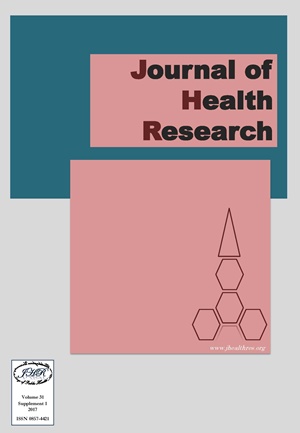Factors Influencing Motorcycle Accidents among Hill Tribe Youths in Chiang Rai, Thailand
Keywords:
Motorcycle accidents, Hill tribe youths, Severe road accidents, Road safety, ThailandAbstract
Background: Motorcycle accidents are one of the significant causes of death in Thailand. Every year, approximately 20,000 people are killed in road traffic accidents. The hill tribe youths are one of the vulnerable populations. This study aimed to investigate the factors associated with motorcycle accidents, and severe accidents among the hill tribe youth in northern Thailand.
Methods: A cross-sectional study was applied to investigate risky motorcycle use behaviors, and to identify factors associated with severe motorcycle accidents among the hill tribe youths aged 15-24 years old in Mae Fah Luang district, Chiang Rai Province, Thailand. Data were collected by a validated questionnaire and face-to-face interview. A logistic regression was used to assess the associations between variables at alpha = 0.05.
Results: 524 participants were recruited, 67.6% were females, 94.7% were students and 80.9% were aged between 15-20 years old. 462 participants (88.2%) had no driving license, 79.6% had experience of motorcycle use for 1-5 years, 66.2% had motorcycle accidents, 38.6% had severe accidents, 11.7% drank alcohol before riding a motorcycle, and 45.0% usually had aggressive tendencies. After control for all possible confounding factors in the multiple logistic regression, four variables were associated with having a greater chance of having motorcycle accidents: (1) males had a greater chance than females (OR=1.96, 95%CI=1.26-3.04), (2) those who had aggressive tendencies had a greater chance than those who did not (OR=1.72, 95%CI=1.15-2.58), (3) those that reported infrequent use of helmet had a greater chance of being involved in road accidents compared to those that used helmets regularly. (OR= 1.47, 95%CI=1.15-5.43) and (4) those who had engine problems had a greater chance of being involved in road accidents compared to those who did not (OR=2.11, 95%CI=1.4-3.16). Two other factors were associated with severe accident; age and length of motorcycle use. Increase in age results in greater chance of having severe accident (OR=1.18 (95%CI=1.04-1.35), and those who rode their motorcycles for ≥ 6 years had a greater risk of having severe accident than those who rode their motorcycles for ≤ 5 years (OR=1.43, 95%CI=1.04-.95).
Conclusion: Appropriate health promotion programs with emphasis on helmet use, regular engine checks, and encouragement to resist riding motorcycles during periods of aggressive or extreme emotional tendencies should be implemented to reduce morbidity and mortality rates from motorcycle use among the hill tribe youth population.






